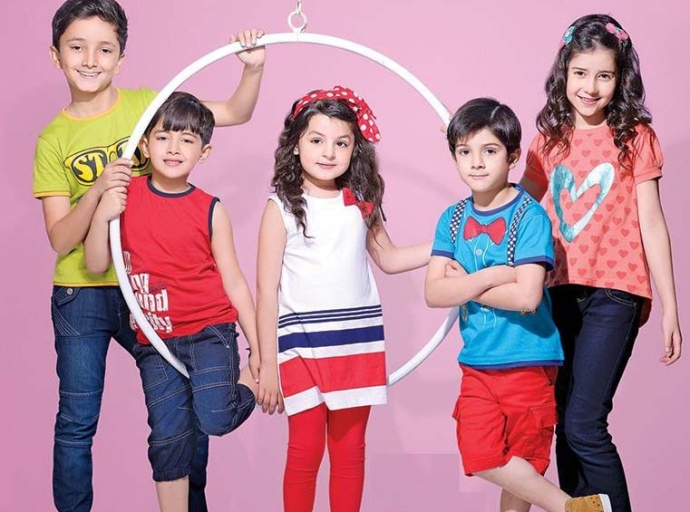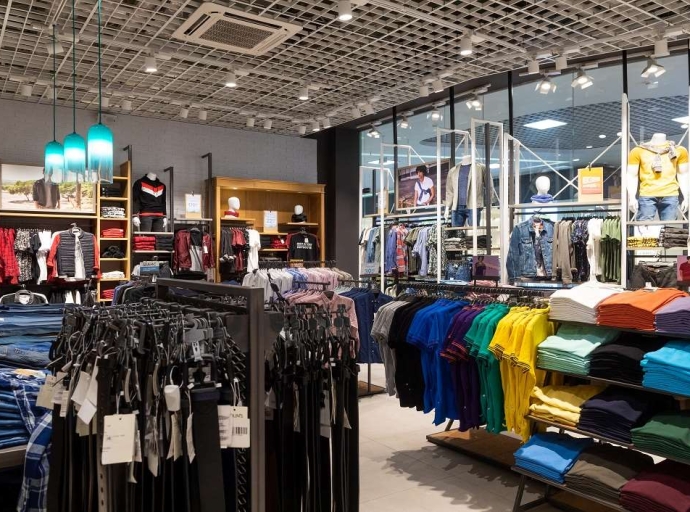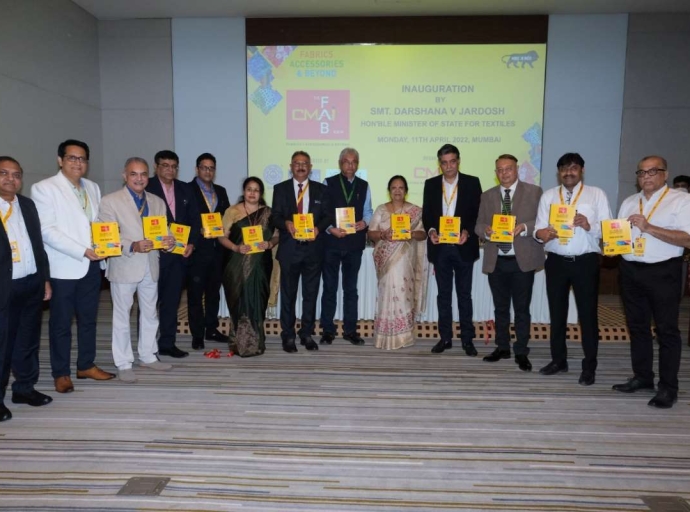Sneaker brand Ludic has forayed into the apparel business with two new collections; ‘DailyMove’ and ‘WillMill.’ Inspired by streetwear and modern art, these collections reflect the playful designs of Ludic’s sneakers.
Inspired by the colors of nature, the DailyMove range offers T-shirts in Koyla Black, Turtledove Beige, Agave Green, Mauvewood Lavender, Della Robbia Blue, and Red Pear shades. These 100 per cent cotton T-shirts are designed for comfort and a wrinkle-free look. They feature a high-definition rubber print for longevity.
Made from 100 per cent cotton fabric, the WillMill sweatshirt range is available in shades of Slate Grey, R&B Blue, Telephone Red, Irani Turquoise, Sundae Crème, and Boomer Pink. Featuring pinwheel inspired full back prints, the sweatshirts are also fleece lined for warmth.
Based in Ahmedabad, Ludic strives to discover untapped potential, explore without limits and be always on the move.The brand’s tagline is ‘always at play’.
All Stories
Sportswear giant Adidas is gearing up to establish a cutting-edge Global Capacity Centre (GCC) in the heart of Chennai. This strategic move aligns with the growing trend among multinational corporations, recognizing India's rich pool of software expertise. Spearheading this initiative is Akhil Kapoor, GBS Global Procurement and Head of GBS India at Adidas.
The Global Business Services (GBS) hub is poised to be a pivotal player, focusing on critical processes such as source-to-pay (S2P), financial planning & analysis (FP&A), invoice-to-cash (I2C), and record-to-report. With an ambitious vision, Adidas aims to onboard top-notch talent, enriching the center with high-quality resources over the next five years.
This move by Adidas not only fortifies its global footprint but also marks a significant contribution to the burgeoning GCC ecosystem in Tamil Nadu. Chennai, in particular, is emerging as the ideal hub for such centers, boasting specialized skills at the intersection of technology and domain expertise, coupled with the ability to scale operations seamlessly.
Adidas joins the list of global corporations that have recently established their maiden centers in Tamil Nadu, including UPS, Hitachi Energy, ChampionX, JGC, Ashley, FleetCor, Sagent, and Udemy. This influx of international players underscores the state's attractiveness and enhances its stature as a thriving business destination.
Chennai's allure extends beyond the sportswear industry, as it hosts major players in diverse sectors. Retail giants Walmart and Amazon, have already established their centers in the city. As Adidas steps into the dynamic business landscape of Chennai, it not only enriches its operational capabilities but also contributes to the city's stature as a global business hub. The trajectory of multinational corporations setting up strategic centers in Tamil Nadu is indicative of the region's economic vibrancy and its pivotal role in the global business arena.
Data released by the Ministry of Commerce and Industry shows, India’s kidswear exports declined by 19.38 per cent Y-o-Y to $880.82 million during the January to October 2023 period.
Analysed by Apparel Resources, the data reveals, kidswear exports to key markets such as the US, UK, Germany, and France declined while exports to the UAE increased slightly.
By value, India’s kidswear exports to the US declined by 29.71 per cent to $276.78 million while exports to the UK declined by 18.76 per cent to $136.28 million. India’s kidswear exports to the UAE surged by 2.10 per cent to $69.10 million, by 15.33 per cent to $34.29 million to France, and 36.23 per cent to $29.71 million to Germany.
The drop in India’s kidswear exports can be attributed to the global economic slowdown, particularly in the US and the EU. The experts advise the industry to target more buyers in the GCC region to potentially boost export revenues in the future.
Luxury Indian fashion retailer Pernia’s Pop-Up Shop has launched a multi-brand ‘Bling and Beyond’ womenswear collection at its store in Mumbai.
To run until December 28, Pernia’s Pop-Up shop focuses on occasion and wedding wear from desPernia’s Pop-Up shop launches new womenswear collection in Mumbai
igners including Zwaan, House of Eda, and Namrata Joshipura among others. It organises various events across metros to boost its offline footfalls.
A few of the events organised by the Pop-Up shop include designer meet and greets and themed shopping fairs. Pernia’s Pop-Up Shop stores recently hosted meet and greets with designers Kalista, Jayanti Reddy, Punit Balana, and Prisho.
Launched by designer and entrepreneur Pernia Qureshi, Pernia’s Pop-Up Shop showcases some of the noted luxury Indian fashion brands. Owned by Purple Style Labs, the business is run by entrepreneur Abhishek Agarwal.
04 January 2024, Mumbai
Rewind 2023
The year 2023 marked a pivotal moment for the Indian apparel retail sector, navigating both triumphs and challenges as it rebounded from the pandemic blues.
Amidst the industry's resilience, the focus shifted from mere revenue figures to a strategic landscape, presenting a tapestry of successes and obstacles demanding careful navigation.
Brick-and-Mortar Giants: Precision in Growth Strategies
Shoppers Stop, a stalwart in the retail domain, crafted a commendable 45% YoY revenue surge in Q2 FY24. This surge was fueled by a strategic approach, riding the wave of premium brand demand and festive cheer.
The retailer's conscious effort to curate a differentiated shopping experience and adapt to evolving consumer preferences proved that brick-and-mortar establishments can thrive, even in the digital age.
Trent Ltd., the parent company of Westside, reported a substantial 32% revenue increase in Q3 FY24, showcasing the effectiveness of its omnichannel strategy. Their success narrative revolves around elevated product offerings and personalized customer service, weaving a seamless tapestry of online and offline experiences for consumers.
E-commerce: Crafting Digital Dominance
In the realm of e-commerce, Myntra emerged as the undisputed champion, boasting a record 52% YoY growth in Gross Merchandise Value (GMV) for Q3 FY24. Amar Nagaram, Myntra's CEO, emphasized their continuous innovation and brand portfolio expansion, key elements driving their digital gold rush.
Nykaa Fashion, the beauty and fashion e-tailer, mirrored this success with a 47% YoY jump in quarterly sales. Their strategic approach, rooted in a curated brand selection and a focus on conscious beauty, underlines the rising tide of mindful consumerism in the digital marketplace.
Luxury's Allure: Strategic Inclusions for Market Exclusivity
Reliance Brands Ltd.'s prestigious additions of renowned luxury brands like Sandro, Maje, Balenciaga, and Valentino, added an exclusive touch to the Indian market. This strategic move aligns with the surging demand for high-end fashion, a trend RBL aims to capitalize on, enhancing India's fashion tapestry.
FabIndia, a champion of handloom and artisanal products, recorded a 26% YoY sales increase, strategically tapping into the growing traction of conscious consumerism. Simultaneously, Sabyasachi Mukherjee's Saree Couture experienced a bright 38% YoY revenue rise, showcasing the enduring charm of heritage weaves.
Tangled Challenges: Strategic Unraveling for Future Success
Rising Costs and Competitive Challenges
Despite vibrant successes, challenges persist. Escalating input costs pose a threat to profit margins, while intense competition keeps the market dynamic. The emphasis on "operational efficiency and cost optimization" becomes paramount, as noted by the CEO of a renowned retailer, to navigate complexities and maintain a competitive edge.
Omnichannel Integration Hurdles
Omnichannel integration remains a hurdle for some, demanding a seamless blend of online and offline experiences. Analysts prescribe strategic measures such as data-driven decision-making, personalized customer engagement, and embracing sustainable practices as imperative for future success.
Threads of Optimism: Strategic Paths to a Fashionable Future
Looking forward, the Indian apparel retail landscape promises a vibrant tapestry woven with threads of optimism.
Rising disposable incomes, expanding internet penetration, and a growing demand for international brands serve as positive indicators. Strategic adaptation to changing trends, prioritizing customer experience, and embracing technology will shape the fashion narrative of India, one strategically stitched moment at a time.
29 December 2023, Mumbai
Rewind 2023
The Indian kidswear scene in 2023 paints a vibrant picture of miniature fashionistas coming into their own. Gone are the days of generic outfits and hand-me-downs. Today's mini-consumers are discerning, demanding, and driving a dynamic shift in the industry. Let's unravel the threads that weave this fascinating narrative:
Comfort Reigns Supreme
Just like adults, kids embraced comfort in 2023. Soft fabrics, breathable materials, and playful prints took center stage in everyday wardrobes. Brands like Mothercare and H&M Kids catered to this demand with stylish yet functional clothing perfect for playing, exploring, and growing.
Sustainability Sprouting
Eco-conscious parents led the charge towards sustainable kidswear. Organic cotton, recycled materials, and upcycled designs gained traction, with brands like The Little Monk and Sprout World offering parents guilt-free options for their little ones.
Cultural Kaleidoscope
While comfort and sustainability ruled the roost, a love for Indian heritage blossomed. Traditional motifs, handloom fabrics, and regional designs like leheriya prints and bandhani dupattas found their way into contemporary kidswear. Brands like Fabindia and Chidiyaa played a crucial role in reinterpreting these age-old elements for the modern child.
The Rise of the Mini-Influencers
Social media played a starring role, with celebrity kids and young influencers setting trends and inspiring parents. Platforms like Instagram and YouTube saw a surge in kidswear content, with parents eagerly seeking style inspiration for their own little ones.
The Digital Playground
Technology has made its mark in the form of personalized online shopping experiences and virtual try-on features. Brands like Myntra Junior and Ajio Kids leveraged AI and interactive platforms to make shopping for kidswear fun and convenient for parents.
Challenges and the Road Ahead
Despite the positive trends, the industry grappled with headwinds. Inflation and supply chain disruptions impacted both manufacturers and retailers. The ever-evolving online landscape, with its fierce competition and demanding customer base, kept brands on their toes.
Goin forward
But as we step into 2024, the Indian kidswear scene is brimming with potential. Brands that can cater to the comfort-conscious, trend-setting, and sustainability-minded parent will be the ones writing the next chapter of success.
They must embrace technology, celebrate diversity, and weave stories that resonate with the aspirations of the modern Indian child, who is no longer a passive passenger but an active participant in shaping their own style narrative.
27 December 2023, Mumbai
As 2023 unwinds, the Indian menswear scene paints a picture of a dynamic shift. Gone are the days of kurtas and suits dominating the landscape.
The modern Indian man is breaking free from sartorial shackles, embracing a new wave of comfort, expression, and conscious consumerism. Let's unravel the threads that wove this fascinating narrative:
The Athleisure Invasion
Comfort reigned supreme in 2023, and nowhere was it more evident than in the rise of athleisure. From high-intensity workouts to casual weekend outings, joggers, sweatshirts, and performance fabrics became menswear staples. Sportswear and activewear brands saw a meteoric rise, catering to the demand for stylish yet functional activewear.
Beyond Basics: Experimentation Takes Flight
Men shed their inhibitions and embraced experimentation. Floral prints, bold colors, and unconventional silhouettes found their way into everyday wardrobes. Designer wear and premium brands took the lead, offering a fusion of traditional motifs with contemporary twists. The growing acceptance of gender-fluid fashion also played a role, blurring the lines between "masculine" and "feminine" aesthetics.
Conscious Choices, Sharp Threads
Sustainability and ethical practices resonated with the modern Indian man. Brands like Fabindia and others witnessed a surge in popularity due to their commitment to organic materials, fair labor practices, and handcrafted techniques. Eco-conscious consumers were no longer willing to compromise style for sustainability.
The Rise of Digital Tailoring
Technology has made its mark in the form of personalized online tailoring platforms. Brands like Blackberrys Menswear and others leveraged AI and 3D body scanning to provide custom-made suits and shirts, offering a perfect fit and catering to diverse body types. This convenience factor resonated with a tech-savvy clientele.
The Regional Renaissance
Just as with women's wear, men's wear embraced the rich tapestry of regional Indian traditions. Bandhani kurtas from Kutch, silk shirts from Benaras, and handloom jackets from Andhra Pradesh found their way into contemporary wardrobes. Brands like Manyavar and Jaypore played a crucial role in reinterpreting these age-old textiles for the modern man.
Challenges and the Road Ahead
Despite the positive trends, the industry grappled with headwinds. Inflation and supply chain disruptions impacted both manufacturers and retailers.
The ever-evolving online landscape, with its fierce competition and demanding customer base, kept brands on their toes.
Moving ahead
But as we step into 2024, the Indian menswear scene is brimming with potential. Brands that can weave together comfort, experimentation, and conscious choices into their narrative will be the ones writing the next chapter of menswear success.
They must cater to the evolving aspirations of the Indian man, who is no longer a silent observer but an active participant in shaping his own style story.
04 January 2024, Mumbai
In a bid to bolster India's textile industry, the Clothing Manufacturers Association of India (CMAI) is set to host its fourth 'Fabrics, Accessories, and Beyond' trade show from April 15 to 17 at the Bombay Exhibition Centre. Sponsored by Fabexa, the event aims to unite manufacturers and buyers from across India, fostering networking and business opportunities.
Key Highlights:
Venue and Participants:
The trade show will occupy a sprawling two-lakh sq. ft. area at the Bombay Exhibition Centre.
Expecting over 200 exhibitors and more than 12,000 trade visitors nationwide.
Stall Bookings Open:
Vendors dealing in textiles, accessories, and related machinery can now book stalls for the event.
Industry Outreach:
CMAI conducted a successful promotional roadshow in Surat, attracting over 100 industry members.
The event emphasized the inclusion of private labels, distributors, e-commerce businesses, overseas buyers, wholesalers, exporters, and retailers.
CMAI's Mission:
The Mumbai-based organization, dedicated to advocating and promoting India's clothing manufacturing industry, has previously organized successful trade shows like the National Garment Fair and Bharat Tex.
The 'Fabrics, Accessories, and Beyond' trade show signals a pivotal moment for India's textile sector, providing a platform for collaboration and growth.
Leading omnichannel retailer FirstCry has witnessed a remarkable financial surge, crossing the Rs 5,000 crore revenue threshold in FY23, marking a 2.4 times increase from the previous fiscal year, as per Entrackr's analysis of the company's recent financial statements.
Notably, the revenue spiked from Rs 2,401 crore in FY22 to Rs 5,632 crore in FY23, emphasizing the company's robust growth. However, this achievement was accompanied by a sixfold rise in losses, reaching Rs 6,316 crore, compared to Rs 2,568 crore in FY22.
Despite its profitability in FY21, FirstCry faces a challenging profitability landscape in FY23. In the midst of these financial dynamics, FirstCry is set to file its IPO papers, targeting a substantial USD 500-600 million fundraise at a valuation of USD 4 billion.
The IPO move coincides with notable transactions involving SoftBank Vision Funds selling additional shares, and influential entities like Sachin Tendulkar's family offices, Ravi Modi, Kris Gopalakrishnan, and TVS group family reportedly acquiring stakes through secondary transactions.
26 December 2023, Mumbai
As the year 2023 draws to a close, the Indian apparel industry finds itself at a crossroads. While a sense of cautious optimism prevails, the past twelve months have been a whirlwind of challenges and triumphs, weaving a complex tapestry of consumer trends and retail disruptions.
The Triumphant Return of Retail
2023 witnessed the much-awaited revival of physical stores. The pandemic's shadow, though still lingering, no longer loomed large.
Consumers, yearning for the tactile experience of shopping, flocked back to malls and high streets, driving footfall and sales. This resurgence was particularly evident in the premium and luxury segments, where leading brands saw a surge in demand.
E-commerce: The Balancing Act
While brick-and-mortar stores experienced a renaissance, e-commerce continued to be a dominant force. However, the focus shifted from blind discounts and aggressive promotions to personalized experiences and omnichannel integration.
Brands like Nykaa and Myntra upped their game with curated collections, influencer partnerships, and seamless online-to-offline shopping options.
Conscious Consumerism Takes Center Stage
Sustainability and ethical practices will become key differentiators in 2023. Consumers, more aware of the environmental and social impact of their choices, sought brands that embraced responsible sourcing, eco-friendly materials, and fair labor practices.
Homegrown labels like Fabindia and Anita Dongre saw a rise in popularity due to their commitment to these values.
Athleisure Reigns Supreme
Comfort remained king in 2023, fueled by the continued emphasis on wellness and work-from-home culture. Athleisure wear, no longer confined to the gym, transcended boundaries, becoming a staple in everyday wardrobes. Brands in the sector saw explosive growth in this segment, catering to the demand for stylish yet functional activewear.
The Rise of Regional Flavors
Indian consumers in 2023 will embrace the rich tapestry of their own diverse heritage. Regional handlooms and crafts, once relegated to niche markets, found mainstream acceptance.
Brands like Chidiyaa and Jaypore capitalized on this trend, offering contemporary interpretations of traditional textiles and designs.
Challenges Remain
Despite the positive signs, the industry grappled with headwinds. Inflationary pressures and supply chain disruptions impacted both manufacturers and retailers. The ever-evolving online landscape, with its cut-throat competition and demanding customer base, kept brands on their toes.
Looking Ahead
As we step into 2024, the Indian apparel industry stands poised for further growth. The key lies in adapting to the evolving consumer landscape, embracing technology, and staying true to the values of sustainability and cultural authenticity.
Brands that can stitch together a strategy that addresses these threads will be the ones weaving success stories in the years to come.
Apparel maker Trent plans to expand its operations by investing around Rs 800 crore this year.
The company aims to capitalise on the consumers' move towards organised apparel retail. One of the company’s premium brand Zudio, has grown substantially over the last few years. The brand sells products priced below Rs 1,000 in Tier II and III cities. The brand’s operating profit grew by 136 per cent per annum over the past four years and currently contributes to 38 per cent of overall operating profit.
With 99 per cent of its stores being profitable, Trent has been able to maintain its store profits. The company directs competes against unorganised and various online retailers. Besides premium apparels, it also operates in the mid to low segments too.
28 December 2023, Mumbai
According to AEPC President Narendra Goenka, the RoSCTL scheme, which gives garment exporters a tax rebate on exports until March 2024, is vital in the midst of global economic instability.
He stresses that the industry should innovate, speed up approvals, expand its market and product range, follow a cluster-based approach, seek investments, and boost its brand image to reach its goal of exporting $40 billion worth of goods by 2030.
Geo-political risk
He also encourages the industry to explore the opportunities of e-commerce and FTAs, adopt sustainable and ethical business practices, and cope with the challenges posed by global conflicts such as Russia-Ukraine and Israel-Hamas, as well as supply chain disruptions caused by attacks on vessels in the Red Sea.
The RoSCTL scheme, which was sanctioned in 2021, covers segments such as garments and made-ups, as well as home textile products.
Fashion designer Neeta Lulla has launched a new bridal collection offering lehengas with two dupatta drapes, saris with trench coats, shararas with corset, pre-stitched saris with belts and phones, and anarkali jackets with ankle length pants.
One of the highlights of this collection is a new amber-yellow raw silk and tulle lehenga called Amulya with a long-sleeved blouse. Adorned with intricate kasa and ek taar resham work, the blouse is embellished with pearl beads, zari, stone, sequin and crystals.
The dupatta of the garment depicts women worshipping the tree, symbolising nature, fertility and the interdependence of all aspects of life, through intricate embroidery.
Another beautiful piece in the collection is a vintage-inspired pearl peach lehenga with sequin florets and dainty crystal embroidery. Known as Moana, the lehenga comes with a sheer basque adorned with katdana and crystal work, finished with butier cutwork at the edges, along with a matching dupatta and a tulle trail.
Embellished with self-color sequin, katdana and beadwork, the Moana lehenga has floral applique work at the bottom. It's blouse has been replaced with a full-sleeve sequin bralette for a cosmopolitan look.
Starting her career in 1986, Lulla initially operated out of a modest studio in Mahim, Mumbai. From designing simpler costumes to being a coveted couturier, Lulla has earned a name as a favorite among brides.




































